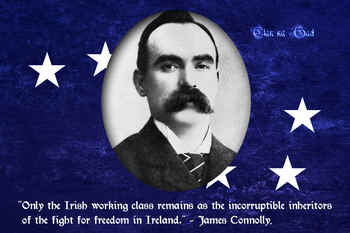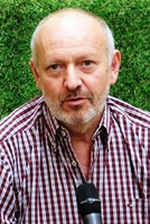Ireland: The 1916 Easter Rising: Comrades of Ours – James Connolly and the Left at the Time
by BELL Geoffrey
 Geoffrey Bell writes about the Easter Rising and the response of the British left. His latest book, Hesitant Comrades, the Irish Revolution and the British Labour Movement, has just been published by Pluto Press.
Geoffrey Bell writes about the Easter Rising and the response of the British left. His latest book, Hesitant Comrades, the Irish Revolution and the British Labour Movement, has just been published by Pluto Press.
Just before he was executed for his part in Ireland’s Easter Rising of 1916 James Connolly asked his daughter, Nora, if she had seen the socialist press. Nora was to report him as saying, “They will never understand why I am here. They forget I am an Irishman.”
The Easter Rising was when a group of armed men and women led by the Irish Republican Brotherhood and Connolly’s Irish Citizen Army proclaimed the formation of the Irish Republic at Dublin’s General Post Office. They were out to end British rule in the whole of Ireland. They had no popular mandate and were easily crushed by the British. Their leaders were executed, while the rank and file and suspected sympathisers were jailed without trial.


 Les autorités ont poussé des cris de victoire à l’arrestation de Salah Abdeslam. « On l’a eu ! »… Quelques jours plus tard, les criminels de Daesh frappaient en plein cœur de Bruxelles. Trente-deux morts, des centaines de blessés, des enfants mutilés. Un carnage horrible. Aurait-il pu être évité ? Peut-être. Le dysfonctionnement des services de sécurité dans le cas d’Ibrahim Barkhaoui est flagrant, et fait penser à l’affaire Dutroux.
Les autorités ont poussé des cris de victoire à l’arrestation de Salah Abdeslam. « On l’a eu ! »… Quelques jours plus tard, les criminels de Daesh frappaient en plein cœur de Bruxelles. Trente-deux morts, des centaines de blessés, des enfants mutilés. Un carnage horrible. Aurait-il pu être évité ? Peut-être. Le dysfonctionnement des services de sécurité dans le cas d’Ibrahim Barkhaoui est flagrant, et fait penser à l’affaire Dutroux. The fascist movement is usually on the rise in situation of political and economic crises with a specific mandate to train the dissatisfied, rebellious masses docile or even enthusiastic servers of capital. At the same time the dispossessed people and their capitalist owners must be convinced that no one can defend their interests better and more consistently than the fascists. Antagonistic interests are to be harmonised. The program of the fascist movement in this respect resembles to the one of social democracy, but its methods are brutal and primitive.
The fascist movement is usually on the rise in situation of political and economic crises with a specific mandate to train the dissatisfied, rebellious masses docile or even enthusiastic servers of capital. At the same time the dispossessed people and their capitalist owners must be convinced that no one can defend their interests better and more consistently than the fascists. Antagonistic interests are to be harmonised. The program of the fascist movement in this respect resembles to the one of social democracy, but its methods are brutal and primitive. Les débats sur l’impérialisme et les enjeux stratégiques combinent plusieurs exigences : d’une part, le besoin d’actualiser la dimension analytique des concepts : comprendre comment s’est transformé le monde capitaliste que nous combattons ; d’autre part, la nécessité de prises de position face à des conflits.
Les débats sur l’impérialisme et les enjeux stratégiques combinent plusieurs exigences : d’une part, le besoin d’actualiser la dimension analytique des concepts : comprendre comment s’est transformé le monde capitaliste que nous combattons ; d’autre part, la nécessité de prises de position face à des conflits. Mercredi 9 mars se sont tenues dans plus de 170 villes des manifestations de masse unifiant la jeunesse et les salarié-e-s contre la politique du gouvernement Valls. Une situation politique et sociale nouvelle s’ouvre en France
Mercredi 9 mars se sont tenues dans plus de 170 villes des manifestations de masse unifiant la jeunesse et les salarié-e-s contre la politique du gouvernement Valls. Une situation politique et sociale nouvelle s’ouvre en France - El encuentro del Plan B en Madrid sirvió para reforzar el contacto entre los ayuntamientos de Manuela Carmena y Ada Colau y el Comité para la Anulación de laDeuda del Tercer Mundo (CADTM)
- El encuentro del Plan B en Madrid sirvió para reforzar el contacto entre los ayuntamientos de Manuela Carmena y Ada Colau y el Comité para la Anulación de laDeuda del Tercer Mundo (CADTM) On 8 December 2015, at the end of his visit to Greece, the UN Independent Expert on Debt, |1| Juan Pablo Bohoslavsky, advised the Hellenic Government “to establish better judicial and administrative accountability for Government officials and decision makers in the private sector” citing the example of Iceland. |2| That small country of 320 000 inhabitants has indeed shown that it is perfectly possible for those responsible for the financial crisis to be prosecuted and condemned to prison sentences. The CADTM interviewed Eva Joly who played a key role as advisor to Iceland’s Special Prosecutor in the criminal investigation and is now MEP for the “Europe Ecologie-The Greens” party. Eva Joly, whom we presented with Éric Toussaint’s latest book, Bancocracy, also discusses how the crisis was managed in Iceland and the pressures brought to bear by its creditors to try to obtain repayment of illegitimate debts.
On 8 December 2015, at the end of his visit to Greece, the UN Independent Expert on Debt, |1| Juan Pablo Bohoslavsky, advised the Hellenic Government “to establish better judicial and administrative accountability for Government officials and decision makers in the private sector” citing the example of Iceland. |2| That small country of 320 000 inhabitants has indeed shown that it is perfectly possible for those responsible for the financial crisis to be prosecuted and condemned to prison sentences. The CADTM interviewed Eva Joly who played a key role as advisor to Iceland’s Special Prosecutor in the criminal investigation and is now MEP for the “Europe Ecologie-The Greens” party. Eva Joly, whom we presented with Éric Toussaint’s latest book, Bancocracy, also discusses how the crisis was managed in Iceland and the pressures brought to bear by its creditors to try to obtain repayment of illegitimate debts. Donald Trump as Adolf Hitler -- absurd, over the top right?
Donald Trump as Adolf Hitler -- absurd, over the top right? Source Resumen Latinoamericano / The Dawn / February 7, 2016.- Interview with Franck Gaudichaud, researcher and teacher, editor of the book “Latin America. Liberation in progress”.
Source Resumen Latinoamericano / The Dawn / February 7, 2016.- Interview with Franck Gaudichaud, researcher and teacher, editor of the book “Latin America. Liberation in progress”. Répondant à l’appel du collectif Solidarité France Grèce pour la Santé et de l’association Bretagne Grèce Solidarité Santé, plus de 80 personnes de 23 collectifs locaux venant de plus de 20 villes et départements (*) se sont retrouvés le 20 février 2016 pour faire le point sur la solidarité avec les dispensaires sociaux grecs et le combat du peuple grec contre les politiques d’austérité imposées par l’union européenne et mises en œuvre par les autorités grecques.
Répondant à l’appel du collectif Solidarité France Grèce pour la Santé et de l’association Bretagne Grèce Solidarité Santé, plus de 80 personnes de 23 collectifs locaux venant de plus de 20 villes et départements (*) se sont retrouvés le 20 février 2016 pour faire le point sur la solidarité avec les dispensaires sociaux grecs et le combat du peuple grec contre les politiques d’austérité imposées par l’union européenne et mises en œuvre par les autorités grecques. Depuis 7 ans, la Grèce est un pays ruiné, avec un peuple épuisé et une démocratie bafouée...
Depuis 7 ans, la Grèce est un pays ruiné, avec un peuple épuisé et une démocratie bafouée... For the casual reader, Poul Thomsen’s recent piece |1| on the role of the IMF in the bailout review negotiations currently taking place between Greece and the Troika would seem balanced and reasonable. At the end of the day, as he has argued elsewhere, |2| the numbers simply need to add up. For that there is a tradeoff between the “ambition of the reforms” Greece needs to impose and the amount of debt relief that can be granted by its European partners. In blunt terms, more austerity implies less debt relief and vice versa. Thomsen argues that given the contentious character of the negotiations the IMF is simply there as a friendly companion that supports both its Greek and European partners to help them make the tough decisions required to develop a program that adds up. However, for someone who is more familiar with the role that the IMF in general, and Thomsen in particular, has played in placing Greece in the precarious situation that it finds itself today, his piece can only be defined as brazen and cynical.
For the casual reader, Poul Thomsen’s recent piece |1| on the role of the IMF in the bailout review negotiations currently taking place between Greece and the Troika would seem balanced and reasonable. At the end of the day, as he has argued elsewhere, |2| the numbers simply need to add up. For that there is a tradeoff between the “ambition of the reforms” Greece needs to impose and the amount of debt relief that can be granted by its European partners. In blunt terms, more austerity implies less debt relief and vice versa. Thomsen argues that given the contentious character of the negotiations the IMF is simply there as a friendly companion that supports both its Greek and European partners to help them make the tough decisions required to develop a program that adds up. However, for someone who is more familiar with the role that the IMF in general, and Thomsen in particular, has played in placing Greece in the precarious situation that it finds itself today, his piece can only be defined as brazen and cynical. En EE UU Estamos asistiendo a un movimiento importante y muy significativo.Por primera vez desde los años 1930, asistimos a debates sobre el socialismo y el fascismo en los medios de comunicación de masas. Bernie Sanders se define, de forma franca, como un socialista democrático, al mismo tiempo que la candidatura de Donald Trump alimenta el debate sobre el fascismo.
En EE UU Estamos asistiendo a un movimiento importante y muy significativo.Por primera vez desde los años 1930, asistimos a debates sobre el socialismo y el fascismo en los medios de comunicación de masas. Bernie Sanders se define, de forma franca, como un socialista democrático, al mismo tiempo que la candidatura de Donald Trump alimenta el debate sobre el fascismo. Atónita asisto al último esperpento madrileño centrado en la obra de títeres que ha terminado con el encarcelamiento de los titiriteros.
Atónita asisto al último esperpento madrileño centrado en la obra de títeres que ha terminado con el encarcelamiento de los titiriteros. The richest 62 persons now control more than half of the world’s money, according to a new Oxfam report. Total wealth of these individuals is the same as that of the world’s poorest 3.6 billion people. The rich-poor gap is growing wider. The ultra-wealthy group of persons is getting wealthier.
The richest 62 persons now control more than half of the world’s money, according to a new Oxfam report. Total wealth of these individuals is the same as that of the world’s poorest 3.6 billion people. The rich-poor gap is growing wider. The ultra-wealthy group of persons is getting wealthier.